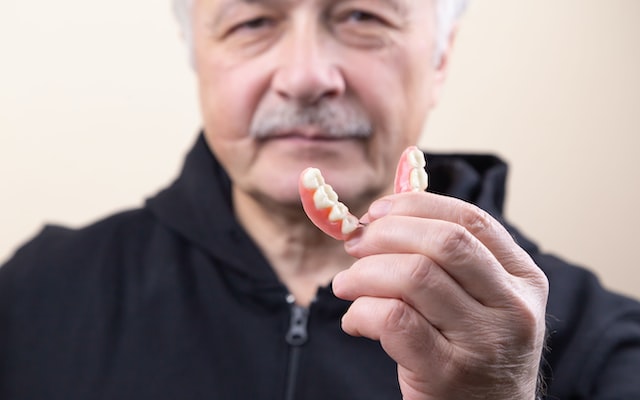
One of the most common ways to respond to lost teeth is dentures. In fact, historians report that dentures date back to 2500 B.C. At this time, they were made from animal teeth. From there, we see a long history of wire-fastened human teeth, stones and seashells acting as teeth, and the ever-iconic wooden dentures. We have certainly come a long way since then!
In the modern age of dentistry, dentures are built simultaneously for comfort and aesthetics. This way, oral and maxillofacial surgeons are able to maximize your smile. If you are missing teeth and are interested in receiving the most cutting-edge dental technology thus far, have a chat with a professional. But first, let’s get you ready for your denture preparation.
When you first speak to a dental professional about getting dentures, they will perform a complete examination. This includes using X-rays, which will determine whether you have any underlying problems with your jawbone and gums. Your gums and soft tissue need to be healthy in order to be ready for the new teeth. This is key to denture preparation because complete dentures—which replace all of your teeth—rest on the gums that cover the jawbones. Following this examination, an oral surgeon may recommend additional procedures to better fit the denture. They may want to remove excess tissue or reshape the bone to get the perfect impression for the dentures.
Multiple kinds of dentures exist so that you can have the best personal experience with your smile. For instance, there are complete dentures. As mentioned previously, these replace all of your teeth in the upper and/or lower half of your mouth. An ideal candidate would be someone who is missing several teeth in a row, with otherwise good oral health. Alternatively, there are partial dentures. Unlike complete dentures, these are a great option for those who still have a number of their natural teeth. These teeth should be sufficient and strong. Partial dentures are made to replace one or more missing teeth, with bridges to connect any gaps. Keeping your situation in mind, your oral surgeon will be extremely thoughtful and thorough during denture preparation.
Tooth loss can naturally come from infection, disease, and trauma. But during denture preparation, tooth loss may come from your oral surgeon extracting them. Be aware that the extraction sites may bring you discomfort for up to several weeks. This is completely normal as you are going through the healing process. Note that if you receive immediate dentures, you are able to immediately wear your new teeth after the extraction. These are complete or partial dentures that are not custom-fitted to your mouth like permanent dentures. Your oral surgeon will have to periodically adjust them until your permanent dentures arrive.
Once you receive your prosthesis following denture preparation, it will feel a little uncomfortable. Your mouth is still adjusting to this new, full feeling. Have patience, and make sure that you are taking this time to rinse your gums to reduce any soreness. Once you have acclimated to your device, you will be able to dive back into life in a way that you couldn’t when you were missing teeth. Dentures allow you to eat with greater ease. Of course, it may take more time for you to start eating harder and stickier foods again. But with the help of a little bit of stabilizing denture adhesive, you won’t be so limited at the dinner table.
When providing you with dentures or dental implants, a general dentist or prosthodontist must accurately determine tooth shade. Occasionally, an oral surgeon will determine tooth shade for a flipper (temporary). To do this, these dental professionals use the VITA Classical Shade Guide. The 16 shades that it consists of range from A1 (lightest shade) to D4 (darkest shade). Patients may be asked how bright or white of a shade they would like. Tooth shade matters during denture preparation because you want your device to look like your natural teeth. It is particularly important if you are going the route of partial dentures, where you still have some natural teeth left.
No matter what type of dentures you receive, handle them carefully and keep them clean. You must be diligent in taking care of them each day. After eating, remove your dentures and rinse away the food debris. Clean your tongue, cheeks, palate, and natural teeth with a soft-bristled toothbrush. Rather than using normal toothpaste on your device, use dishwashing liquid. With normal toothpaste, the chemicals that would otherwise whiten and strengthen your teeth may harm your dentures. You can minimize staining by using safe, over-the-counter denture cleanser products. Do not use bleach unless otherwise given specific instructions by your oral surgeon.
Some years down the line, you may find that your dentures no longer fit as well as they once did. Other signs that you might need a denture reline include experiencing prolonged discomfort, difficulty chewing due to slippage, and gum irritation. If any of these things is the case, you will need to schedule an appointment with your oral and maxillofacial surgeon. They may then refer you to a general dentist or prosthodontist who will guide you through the process of relining your denture. Do not attempt to reline your dentures on your own. This procedure needs to be handled by a professional so that you achieve the tightest, best fit for your mouth.
No matter how challenging your case, a Board Certified Oral and Maxillofacial Surgeon will be able to maximize your most desired outcome. Denture preparation is one of the specialties of Dr. Alford. He offers his pre-prosthetic surgery services at Lake Travis Oral Surgery and Bastrop Oral Surgery. If you would prefer to get dental implants rather than dentures, Dr. Alford does that, as well, at a very affordable cost. We would love to hear from you to learn about what your mouth’s needs are!